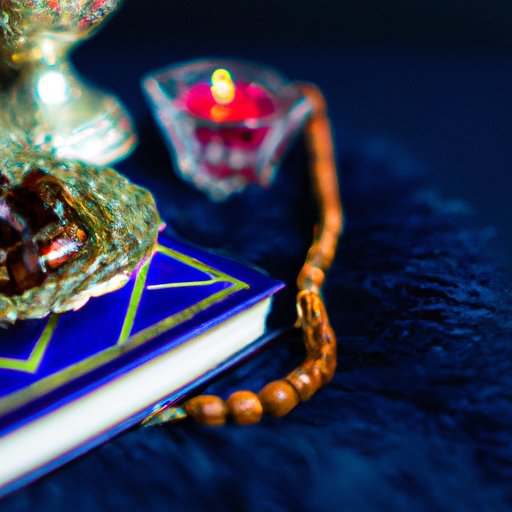Introduction
Ramadan is an Islamic holy month observed by more than 1.6 billion Muslims worldwide. It is a time of spiritual reflection, renewal and connection with Allah (God). During this month, Muslims abstain from food, drink, and other physical pleasures from sunrise to sunset. They also engage in charitable acts and spend time with family and friends.

Exploring the Spiritual Significance of Ramadan
For Muslims, Ramadan is a time for spiritual renewal and growth. According to Imam Zaid Shakir, “The primary purpose of Ramadan is to create an environment in which the individual can become more conscious of his or her relationship with God.” During this month, Muslims strive to be more mindful of their actions and intentions. They focus on prayer, fasting, reciting the Quran, and giving charity.
Examining the Fasting Requirements During Ramadan
Fasting during Ramadan is one of the five pillars of Islam. According to a study published in the Journal of Nutrition and Metabolism, fasting has many physiological benefits, including improved metabolic health, weight loss, and reduced inflammation. It can also help improve mental clarity and reduce stress levels. However, it is important to note that fasting should not be done without medical supervision and should be done only when healthy.
Investigating the Impact on Health and Wellness
In addition to its spiritual benefits, Ramadan also has positive effects on health and wellness. Research has shown that fasting during Ramadan has beneficial effects on cardiovascular health, blood sugar levels, and cholesterol. Additionally, the increased focus on prayer and spiritual reflection can lead to improved mental health and emotional well-being. Finally, Ramadan encourages healthy eating habits and discourages overeating.
Understanding the Social Aspects of Ramadan
Ramadan is also a time of social gatherings and celebration. During this month, Muslims gather with family and friends to break their fasts at sunset, known as iftar. This meal often includes traditional dishes such as dates, soups, and stews. Additionally, mosques and community centers often host special events, such as lectures and religious discourses, to celebrate the month.
Exploring Different Types of Ramadan Celebrations
Different countries and cultures have different ways of celebrating Ramadan. In some countries, such as Egypt, people decorate their homes and streets with lanterns and lights. In other countries, such as Turkey, people gather in public parks and squares for communal meals and performances. In India, people exchange gifts and sweets with family and friends. No matter how Ramadan is celebrated, it is a time of togetherness and joy.
Examining the Cultural Significance of Ramadan
Ramadan is more than just a religious observance; it is also a cultural phenomenon. According to Dr. Muzammil H. Siddiqi, former president of the Islamic Society of North America, “Ramadan is a great opportunity to learn about our faith, to practice it, to strengthen our relationship with Allah, to increase our knowledge and understanding of the Qur’an, and to develop our moral character.” For this reason, Ramadan is an important part of Muslim culture and identity.
Conclusion
Ramadan is an important time for Muslims all over the world. It is a time of spiritual reflection and renewal, as well as a time of social gathering and celebration. Through fasting, prayer, and the sharing of meals with family and friends, Muslims are able to deepen their connection with Allah and strengthen their cultural identity. Ramadan is truly a unique and meaningful experience.
(Note: Is this article not meeting your expectations? Do you have knowledge or insights to share? Unlock new opportunities and expand your reach by joining our authors team. Click Registration to join us and share your expertise with our readers.)
